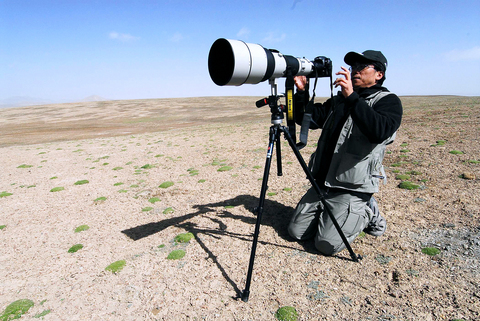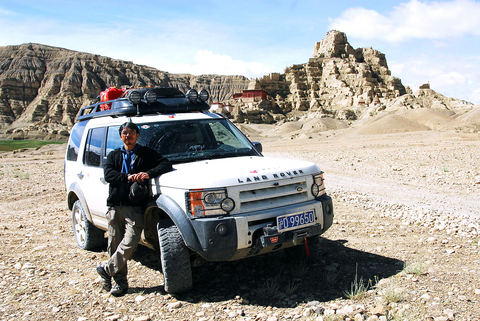When talking to the editor-in-chief of Rhythms Monthly (經典雜誌) Wang Chih-hong (王志宏), it is hard to image that the soft-speaking, svelte gentleman in front of you is an intrepid traveler and international aid worker who has been living his life to the full, lending a helping hand to people in need around the world.
A legendary figure in the eyes of the adventurous, Wang began his long-term marriage to traveling as a photographer at the Earth Geographic Monthly (大地地理雜誌). Four years of journalism made Wang a global trekker, but he gradually grew weary of short trips that could only allow him to scratch the surface of the cultural and historic immensities of each destination. So he did what many people dream about but never dare to do: he quit his job and embarked on a journey to remote areas of the world.
“Social status is of no importance to me. I want to live my life on the ground and be true to myself so that I don’t have any regrets,” Wang said.

PHOTO COURTESY OF WANG CHIH-HONG
Young and fearless, Wang ventured deep into Tibet in 1990, an isolated region that was closed to foreigners, and began his decade-long journalistic project on the land and its people. As a volunteer for the China Exploration and Research Society, Wang had also thrown himself into conservation work in the remoter regions of China, spending his days counting yaks and endangered birds, or joining the society’s expeditionary survey on the ancient silk road in collaboration with the National Aeronautics and Space Administration.
Like a sponge absorbing everything he had seen along the way, Wang began to plan a project of his own. Even though five years of traveling in Tibet had given him enough material for a planned publication, the traveler felt there was something seriously lacking in his work. “The land had given me so much, and I felt it was my duty to give something back in return... . The nature of a journalist’s job is to get what is needed for his or her story and leave. But to me, that’s a form of exploitation,” Wang said.
Seeing how the lives of Tibetans on the remote Tibetan Plateau were seriously plagued by the lack of access to even the most basic medical treatment, Wang sought out professional support from doctor Chiu Jen-hui (邱仁輝). Together, they set up a medical training camp in 1995, funded by bank loans and donations from friends and family members. The pair trained Tibetans who were interested in becoming village doctors in remote mountain regions.

PHOTO COURTESY OF WANG CHIH-HONG
“The hardship the locals endure is unimaginable to people used to modern conveniences... . Take transportation for example, it often takes two days for a village doctor to reach his patients,” said Wang.
Now funded by the Friends of Tibet Society (財團法人中華藏友會), the project has trained over 200 village doctors who can provide medical aid and health services to isolated nomadic tribes.
The humanitarian returned to Taiwan in 1998 and established the award-winning Rhythms Monthly, a magazine funded by the Tzu Chi Cultural and Communication Foundation (慈濟傳播文化志業基金會). His return to the media seemed a natural move to Wang as he was always drawn to the idea of creating high-quality publications.
Hailed as Taiwan’s National Geographic, the monthly magazine positioned itself from the beginning as a pioneering medium that explores the world from a local perspective. “With backing from the nonprofit Tzu Chi foundation, we are free to do what the profit-driven media can’t; [that is] help to cultivate global viewpoints in the minds of our journalists and readers,” Wang said.
Years of preparation, researching and reporting need to go into the magazine’s annual reports on selected topics such as the epic sea voyage of Zheng He (鄭和) (1371-1435 AD) and the 19-year Silk Road voyage of the Tang Dynasty Buddhist monk Xuanzang (玄奘).
Following the routes taken by the two greatest explorers in Chinese history, the troupe of journalists and photographers were dispatched in small numbers across Asia and Africa. From China, India, Nepal to Central and Southern Asian countries, their lauded accomplishment not only served as an inspiration for the Discovery channel’s documentary on Zheng He’s sea voyage but led to several international touring exhibitions and picture-filled tomes.
“I have done it all myself so I also expect my colleges to meet high demands,” Wang said, adding that the most important rule of the game is to play it safe, even though the most experienced reporter can run into danger every now and then. “An editor-in-chief’s worst nightmare is to get a phone call in the middle of the night. And it happens,” Wang said.
The magazine has also conducted a comprehensive study on Taiwan’s history starting from the Austronesian culture dating as far back as 10,000 years. Large amounts of documents and publications in Europe from the 16th century to 18th century were examined to shed light on the island’s relation with Western world powers and China.
The magazines’ adventurers are also among the first ones to arrive in disaster zones and spend months doing follow-up reports on the regions. Taiwanese readers gained a better under-standing of humanitarian problems with first-hand reports on tsunami-ravaged Indonesia and Sri Lanka, earthquake-shaken Pakistan or hurricane-plagued New Orleans. Following the Tzu Chi Foundation’s international aid teams, journalists are able to enter countries and regions normally closed to the outside world, such as North Korea and Afghanistan under the Taliban.
“At Rhythms Monthly, I can feel more comfortable with my job as a journalist. Going to places with aid teams, we can be of some help and not just build our stories around other people’s suffering,” Wang said.
An explorer by nature, Wang never fails to find time in his busy schedule to answer requests from his life-long friend Wong How-man (黃效文) for expeditions. The magazine was the first medium in the world to call global attention to the dwindling numbers of endangered species in Tibet, particularly the Tibetan antelope, which inhabits the Tibetan Plateau.
Encountering untold misery and injustice during his travels, Wang certainly has had moments of despair but finds solace in the contributions he can make. “You can’t change the system but you can do small things to help,” Wand said. “And even if you fail, at least you can face yourself with a clear conscience. I know I will never become a good journalist, because whenever I see a person suffering, my first reaction is to put down the camera and help that person.”
It is a heartfelt reflection on the world from a humble humanitarian who has seen it all.

Taiwan has next to no political engagement in Myanmar, either with the ruling military junta nor the dozens of armed groups who’ve in the last five years taken over around two-thirds of the nation’s territory in a sprawling, patchwork civil war. But early last month, the leader of one relatively minor Burmese revolutionary faction, General Nerdah Bomya, who is also an alleged war criminal, made a low key visit to Taipei, where he met with a member of President William Lai’s (賴清德) staff, a retired Taiwanese military official and several academics. “I feel like Taiwan is a good example of

March 2 to March 8 Gunfire rang out along the shore of the frontline island of Lieyu (烈嶼) on a foggy afternoon on March 7, 1987. By the time it was over, about 20 unarmed Vietnamese refugees — men, women, elderly and children — were dead. They were hastily buried, followed by decades of silence. Months later, opposition politicians and journalists tried to uncover what had happened, but conflicting accounts only deepened the confusion. One version suggested that government troops had mistakenly killed their own operatives attempting to return home from Vietnam. The military maintained that the

Before the last section of the round-the-island railway was electrified, one old blue train still chugged back and forth between Pingtung County’s Fangliao (枋寮) and Taitung (台東) stations once a day. It was so slow, was so hot (it had no air conditioning) and covered such a short distance, that the low fare still failed to attract many riders. This relic of the past was finally retired when the South Link Line was fully electrified on Dec. 23, 2020. A wave of nostalgia surrounded the termination of the Ordinary Train service, as these train carriages had been in use for decades

Lori Sepich smoked for years and sometimes skipped taking her blood pressure medicine. But she never thought she’d have a heart attack. The possibility “just wasn’t registering with me,” said the 64-year-old from Memphis, Tennessee, who suffered two of them 13 years apart. She’s far from alone. More than 60 million women in the US live with cardiovascular disease, which includes heart disease as well as stroke, heart failure and atrial fibrillation. And despite the myth that heart attacks mostly strike men, women are vulnerable too. Overall in the US, 1 in 5 women dies of cardiovascular disease each year, 37,000 of them